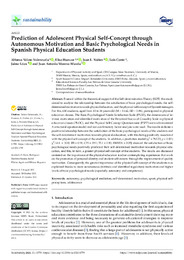Título :
Prediction of adolescent physical self-concept through autonomous motivation and basic psychological needs in spanish physical education students |
Autor :
Valero-Valenzuela, Alfonso
Huéscar Hernández, Elisa
Núñez, Juan L.
Conte, Luis
León, Jaime
Moreno-Murcia, Juan Antonio |
Editor :
MDPI |
Departamento:
Departamentos de la UMH::Psicología de la Salud |
Fecha de publicación:
2021-10 |
URI :
https://hdl.handle.net/11000/38434 |
Resumen :
Framed within the theoretical support of the Self-determination Theory (SDT) this study
aimed to analyze the relationship between the satisfaction of basic psychological needs, the selfdetermined
motivation towards physical education, and the physical self-concept of Spanish teenagers.
For this, 618 students, aged from 10 to 14 years-old (M = 11.62, SD = 0.94), participated in physical
education classes. The Basic Psychological Needs Satisfaction Scale (PNSE), the dimensions of intrinsic
motivation and identified motivation of the Perceived Locus of Causality Scale in physical
education classes (PLOC), and the Physical Self-Concept Questionnaire (PSPP) were administered.
A structural equation model and test confirmatory factor analysis were used. The results indicate a
positive relationship between the satisfaction of the basic psychological needs of the students and
the self-determined motivation towards physical education, with this being positively associated
with the physical self-concept of the students. In addition, a prediction model ( 2 = 763.23; p < 0.001;
2/d.f. = 3.00; IFI = 0.91; CFI = 0.91; TLI = 0.90; RMSEA = 0.05) showed the satisfaction of basic
psychological needs positively predicted their self-determined motivation towards physical education,
and this, in turn, a greater physical self-concept of the students. The results are discussed
centered on the importance of the physical education teacher contemplating experiences that work
on the promotion of personal identity and student self-esteem through the improvement of quality
motivation. Consequently, the greater importance of the physical self-concept of the students was
explained thanks to more autonomous (intrinsic and identified regulation) motivation and higher
levels of basic psychological needs (especially autonomy and competence).
|
Palabras clave/Materias:
Autonomy
Psychological mediators
Self-determined motivation
Sport
Physical self-perceptions
Adolescence |
Tipo de documento :
info:eu-repo/semantics/article |
Derechos de acceso:
info:eu-repo/semantics/openAccess
Attribution-NonCommercial-NoDerivatives 4.0 Internacional |
DOI :
https://doi.org/10.3390/su132111759 |
Publicado en:
Sustainability, Vol. 13, Nº 21 (2021) |
Aparece en las colecciones:
Artículos- Psicología de la Salud
|
 La licencia se describe como: Atribución-NonComercial-NoDerivada 4.0 Internacional.
La licencia se describe como: Atribución-NonComercial-NoDerivada 4.0 Internacional.
.png)
